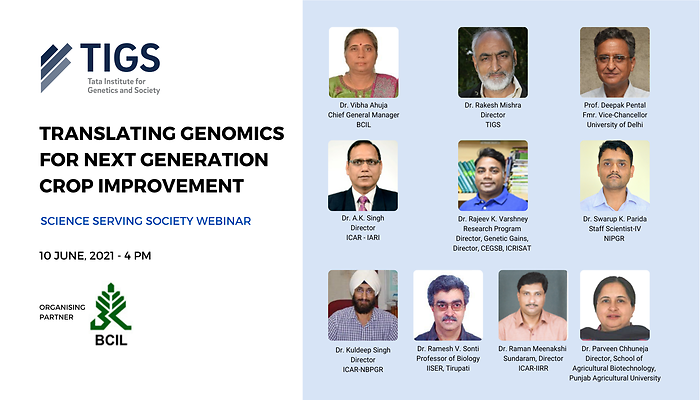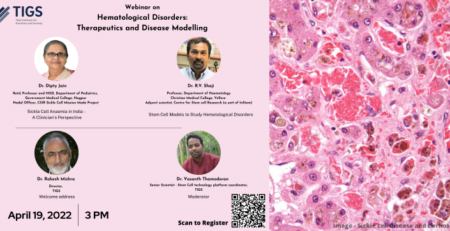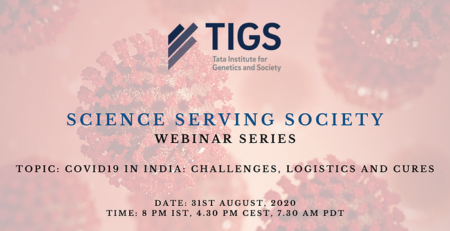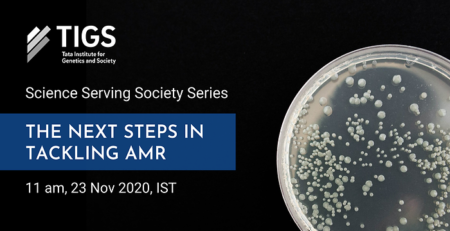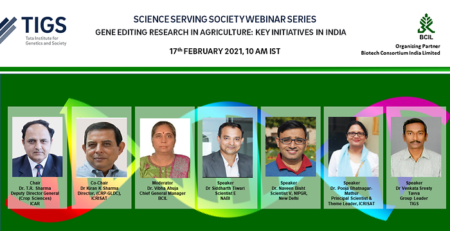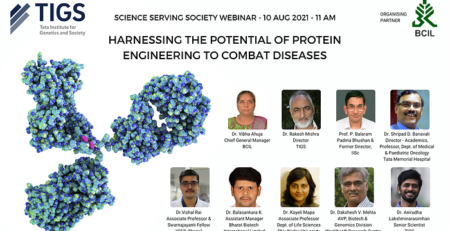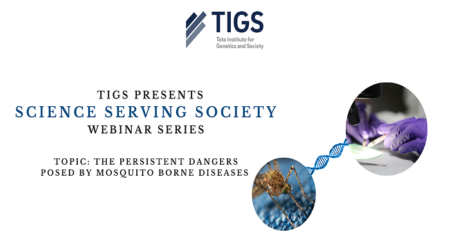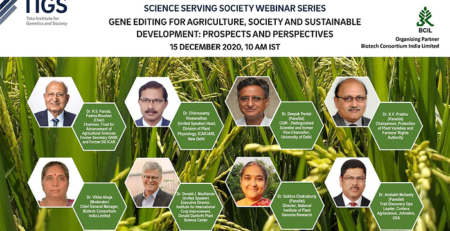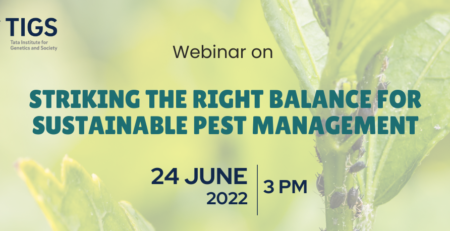Webinar recording
10 June 2021, 4 pm IST
Zoom webinar
Welcome address:
Dr. Vibha Ahuja, Chief General Manager, Biotech Consortium India Limited (BCIL)
Opening Remarks:
Dr. Rakesh Mishra, Director, TIGS
Chair:
Dr. Deepak Pental, Fmr. Vice-Chancellor, University of Delhi
Presentations:
- Genomic assisted breeding 2.0 for crop improvement by Dr. Rajeev Varshney, Research Program Director, Genetic Gains and Director, Center of Excellence in Genomics & Systems Biology, ICRISAT
- Integrating modern genomic tools with plant breeding in rice by Dr. A.K. Singh, Director, ICAR – Indian Agricultural Research Institute
- Genomics assisted breeding in chickpea by Dr. Swarup K. Parida, Staff Scientist-IV, National Institute of Plant Genome Research
Panel discussion:
- Dr. Kuldeep Singh, Director, ICAR-National Bureau of Plant Genetic Resources
- Dr. Ramesh V. Sonti, Professor of Biology, IISER, Tirupati
- Dr. R.M. Sundaram, Director, ICAR-Indian Institute of Rice Research
- Dr. Parveen Chhuneja, Director, School of Agricultural Biotechnology, Punjab Agricultural University
Highlights

Dr. Rakesh Mishra talked about how genomics has become a game-changer in healthcare and agriculture. Using traditional methods in tandem with modern genomic tools could contribute greatly to improving food security while keeping the environment safe. He also spoke about the importance of efficient communication and education about available technologies and the benefits of adopting them.

Prof. Deepak Pental emphasized the importance of protecting crops from pests and infections, improving crop yields in the country, and reducing the dependence on natural resources, especially water. He also spoke about the need for utilizing new technologies at an accelerated pace in overcoming these challenges and enabling science to serve society.

Dr. Rajeev Varshney spoke about how modern genetic tools can be used to address issues seen in crop breeding and improve the pace of genetic gains in crop improvement programs. He elaborated on the innovative genomics approaches being undertaken for chickpea, pigeon pea and groundnut at ICRISAT, particularly the development of pangenomes and super pangenomes, genotyping platforms, trait mapping approaches, and translational research based on genomic breeding approaches. He also mentioned the need for international, national, and local government support and a conducive policy environment to realize the potential of these innovations through efficient management, agronomy, and market access.

Dr. A.K. Singh talked about the importance of rice breeding programs and new varieties of rice being developed. His presentation included details of new varieties of basmati rice, developed through molecular breeding, with favorable traits such as resistance to blast, brown plant hopper, drought, and tolerance to higher temperatures and salinity. He also spoke about Direct Seeded Rice, which is a method that has a much lesser requirement for water in rice cultivation, and new basmati rice varieties that can be grown as direct seeded rice.

Dr. Swarup K. Parida focused on next-generation molecular breeding methods for genetic improvement of chickpea. He talked about his team’s efforts to develop several high-yielding varieties of chickpea and India’s contributions to global crop plant genome sequencing projects, such as that for chickpea, pigeon pea, finger millet pearl, and many more.

Dr. Kuldeep Singh articulated how genomics and gene banks can be integrated for future readiness. He also talked about the importance of germplasm and its role in the success of the Green Revolution in India, and the challenges associated with assimilating genetic resources in gene banks.
Dr. Ramesh Sonti talked about how the National Genomics and Genotyping Facility at NIPGR was set up to provide support through infrastructure and consultancy to enhance the utilization of new knowledge available from genomics research in crop improvement. The facility would share access to genotyping data, phenotyping data and seeds with organizations across the country, thereby facilitating a national movement towards the utilization of germplasm and mapping mutations. He also talked about the need for setting up speed breeding facilities across the country to reduce the number of generations needed for new varieties and generating digital plans for crops, which include all metabolic and developmental pathways for a particular crop.
Dr. Raman Sundaram highlighted that the pace of adoption of new genetic technologies in crop improvement has been low, due to limitations in infrastructure, trained manpower, funding, and logistics. He emphasized the need for these challenges to be addressed, improve the progress we make in functional genomics research in the country, and the importance of exploratory biological research. He also said that more investments are needed towards pathogen genomics, soil-microbe genomics, genomics of yield, and genomics of wild relatives of crops.
Dr. Parveen Chhuneja talked about genomics research currently being done in wheat. Dr. Chhuneja’s team was involved in efforts to sequence 250 accessions of wild wheat. Such efforts could help mine diversity from wild relatives, which can be made available for crop improvement programs. She also talked about new technologies that have proved useful for mapping complex genomes such as that of wheat.

